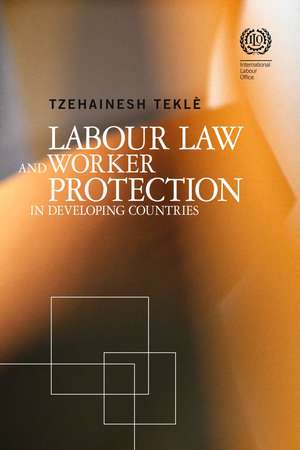Labour Law and Worker Protection in Developing Countries
Editat de Tzehainesh Teklèen Limba Engleză Paperback – 10 feb 2010
Preț: 656.06 lei
Preț vechi: 942.89 lei
-30% Nou
Puncte Express: 984
Preț estimativ în valută:
125.54€ • 136.79$ • 105.78£
125.54€ • 136.79$ • 105.78£
Carte tipărită la comandă
Livrare economică 23 aprilie-07 mai
Preluare comenzi: 021 569.72.76
Specificații
ISBN-13: 9781841138879
ISBN-10: 1841138878
Pagini: 338
Dimensiuni: 156 x 234 x 17 mm
Greutate: 0.48 kg
Ediția:New.
Editura: Bloomsbury Publishing
Colecția Hart Publishing
Locul publicării:London, United Kingdom
ISBN-10: 1841138878
Pagini: 338
Dimensiuni: 156 x 234 x 17 mm
Greutate: 0.48 kg
Ediția:New.
Editura: Bloomsbury Publishing
Colecția Hart Publishing
Locul publicării:London, United Kingdom
Notă biografică
Tzehainesh Teklè is a member of the International Institute for Labour Studies of the International Labour Organization.
Cuprins
1. Workers' protection and labour law in the South: An evolving tension between models and realityTzehainesh Teklè1.1 Strengthening the presence of southern perspectives in the current debates on labour law1.2 A n analytical approach to studying the impact of labour law in the South1.3 The structure of the book1.4 The challenge of the mismatch between socio-legal categories and reality1.4.1 The structural features of the world of work and labour law1.4.2 A world of work in evolution1.5 The problem of enforcement: Structural and new dimensions1.6 L abour law and gender equality1.6.1 The gendered construction of the law1.6.2 Labour law and the promotion of gender equality at work1.6.3 The interactions of labour law with other branchesof law and non-state sources of law1.6.4 The impact of globalization1.7 C onclusionsPART I. Worker access to labour law protection: Historical challenges and the impact of globalization2. The effectiveness of labour law and decent work aspirations in the developing countries: A framework for analysisRachid Filali Meknassi2.1 Introduction2.2 The ineffectiveness of labour law as an expression of socio-legal pluralism2.2.1 One labour law, many labour law systems2.2.2 Inadequate integration into the dominant trade networks: The main source of legal ineffectiveness in the southernCountries 2.3 The ineffectiveness of labour law: A symptom of the decent work deficit2.3.1 The ineffectiveness of workers' rights and poor overall effectiveness of law2.3.2 A fair globalization: A factor in promoting decent work and effective rights3. Trade liberalization, labour law and development: A contextualizationAdelle Blackett3.1 Introduction3.2 The foundations of multilateral trade: Embedded liberalism and the convenience of colonialism3.3 The inherent tension between trade liberalization, labour law, and the role of the contemporary state in post-colonial developing economies3.4 The terrain of labour law reform in developing countries3.4.1 Mexico3.4.2 The Caribbean Community (CARICOM)3.4.3 Mauritius3.4.4 Cambodia3.4.5 The Republic of Korea3.5 T owards a globally embedded liberalismPART II. Labour law and worker protection in the South: Regional perspectives4. Labour law in Latin America: The gap between norms and realityGraciela Bensusán 4.1 Introduction4.2 The evolution of labour law, and the economic and political context4.3 Worker protection under labour law: Old and new problems4.3.1 The limited scope of labour law4.3.2 Recent responses to changing forms of work4.3.3 Problems relating to enforcement mechanisms4.4 Gender equality: The case of Mexico4.4.1 The legal framework and the situation of women workers in the labour market4.4.2 The situation in the export-oriented maquilagarment industry4.5 C onclusions5. Labour law: A southern African perspective Colin Fenwick, Evance Kalula, and Ingrid Landau 5.1 Introduction 5.2 The evolution of labour law in southern Africa5.2.1 Colonization5.2.2 Post-independence5.2.3 Economic liberalization5.2.4 Democratization5.2.5 The role of the ILO5.2.6 Regional integration5.2.7 Concluding remarks5.3 The challenges facing labour law in southern Africa5.3.1 The socio-economic environment5.3.2 The relationship of labour law to economic objectives5.3.3 The scope of the employment relationship and changing patterns of work5.3.4 The limited capacity of labour law institutions5.4 Gender equality in Lesotho: A case study5.4.1 The legal and policy framework5.4.2 The role of labour law in reinforcing the existing gender inequalities5.4.3 Proposed labour law amendments5.4.4 The enforcement of labour laws5.4.5 Complementarities between labour laws and other laws5.4.6 Concluding remarks5.5 Conclusions6. Labour laws in South Asia: The need for an inclusive approachKamala Sankaran6.1 Introduction6.2 Historical evolution6.3 L abour law in South Asia: Features and proposals for reform6.3.1 Features of labour law in the South Asia region6.3.2 Current debates around labour law6.4 L aw and gender equality6.4.1 The gendered notion of "work"6.4.2 The gendered notion of labour law6.4.3 The gendered impact of "neutral" laws: Examples6.4.4 The nature of the labour law for women: Equality or protection?6.4.5 Night work by women6.5 Conclusions
Descriere
This important study shifts the focus of scholarly and policy debates around the role of labour law away from the North to those of the global South.
